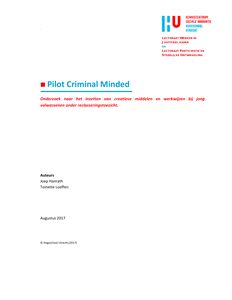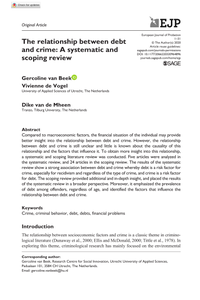Kernwerkzaamheden van de reclassering zijn advies, toezicht, werkstraf, gedragsinterventies en toe leiden naar zorg. Doel is het verminderen van recidive en het bevorderen van inclusie en maatschappelijke participatie. De reclassering krijgt sinds enige tijd meer ruimte om persoons-gericht maatwerk te leveren en toe te leiden naar innovatieve werkwijzen en projecten (Bosker & Lünnemann, 2016). Onder de noemer Ruim Baan voor Betekenisvol Maatwerken wordt gezocht naar een andere manier van werken met burgers die zijn aangehouden voor een delict, waar ernstige sociale problematiek onder schuil gaat. Reclasseringswerkers worden gestimuleerd om out of the box te denken, aansluiting te vinden bij het sociale domein en context- en herstelgericht te werken. In dit onderzoek wordt een nieuw initiatief onder de loep genomen: Criminal Minded. Een cursus bestaande uit acht workshops, vier individuele contacten en een gezamenlijke afsluiting. Met creatieve werkwijzen en middelen als storytelling, rap, spoken word, poëzie, dans en geïnspireerd door ervaringsdeskundigen, rolmodellen, artiesten en ondernemers worden de deelnemers met reclasseringstoezicht geholpen in de zoektocht naar een nieuwe baan of stageplek. De onderzoeksvraag was: biedt de cursus Criminal Minded aan jong volwassenen met reclasseringstoezicht de mogelijkheid om, middels creatieve middelen, hun sterke punten in kaart te laten brengen en hen aan te laten haken bij opleiding, werk of ander levensdoel? Met een participatief onderzoek is beschrijvend en met visuele middelen in kaart gebracht wie aan de cursus hebben deelgenomen, wat er gedurende workshops is gedaan en wat dit de deelnemers heeft opgeleverd.
DOCUMENT

In this article, the author will question the seemingly obvious boundary between civil disobedience, as conceptualised by Rawls and Arendt, and several examples of criminal, or simply annoying, activities which don't meet their criteria, such as the case of the ‘Top 50'. The ‘Top 50' are multi-problem Dutch-Caribbean men, who refuse to adapt to predominant norms in Dutch society. IThe author argues that political aspects of their behaviour should be acknowledged, even if they engage in criminal behaviour and don't present explicit political goals. Firstly, she questions the way in which Rawls based his definition on a centralistic conception of governmental power and contrast it with Foucault's conception of normalising power, in which power is diffuse and cannot be restricted to the enactment of formal laws. Secondly, she discusses what the minimum requirements are to be able to classifyacts as civil disobedience. Rawls and Arendt draw a clear line between criminal behaviour and civil disobedience, but their requirements may be too strict. We might miss signals of injustice if actions that do not meet these criteria are excluded from the political discourse. The conclusion is that comparing Arendt's and Rawls' conception of civil disobedience with the behaviour of a marginal migrant group may be useful in questioning the boundaries of this concept and in making it more inclusive. A wider conception of civil disobedience may help to explain the meaning of deviant behaviour in terms of social critique and to challenge the traditional understanding of civil disobedience.
DOCUMENT

The past two decades, a disproportionate growth of females entering the criminal justice system and forensic mental health services has been observed worldwide. However, there is a lack of knowledge on the background of women who are convicted for violent offenses. What is their criminal history, what are their motives for offending and in which way do they differ from men convicted for violent offenses? In this study, criminal histories and the offenses for which they were admitted to forensic care were analyzed of 218 women and 218 men who have been treated between 1984 and 2014 with a mandatory treatment order in one of four Dutch forensic psychiatric settings admitting both men and women. It is concluded that there are important differences in violent offending between male and female patients. Most importantly, female violence was more often directed towards their close environment, like their children, and driven by relational frustration. Furthermore, female patients received lower punishments compared to male patients and were more often considered to be diminished accountable for their offenses due to a mental illness.
MULTIFILE

Full text aanvragen via link What makes a juvenile delinquent develop into an adult criminal? What defines-cognitively, developmentally, legally-the transition from juvenile to adult and what determines whether patterns of criminal behavior persist? In most US states and Western nations, legal adulthood begins at age 18. This volume focuses on the period surrounding that abrupt transition (roughly ages 15-29) and addresses what happens to offending careers during it. Edited by two leading authorities in the fields of psychology and criminology, Transitions from Juvenile Delinquency to Adult Crime examines why the period of transition is important and how it can be better understood and addressed both inside and outside of the justice system.
LINK
ENGLISH: A vast and growing body of research has shown that crime tends to run in families. However, previous studies focused only on traditional crimes and research on familial risk factors for cyber offending is very scarce. To address this gap in the literature, the present study examines the criminal behavior of the family members of a sample of cyber offenders prosecuted in the Netherlands. The sample consists of 979 cyber offenders prosecuted for computer trespassing between 2001 and 2018, and two matched groups of 979 traditional offenders and 979 non-offenders. Judicial information and kinship data from Dutch Statistics were used to measure criminal behavior among family members. Both traditional offenders and cyber offenders were found to be more likely to have criminal fathers, mothers, and siblings than non-offenders. Additional analyses, however, showed different patterns between cyber offenders who were only prosecuted for cyber offenses and those who also committed traditional crimes. While the former group of cyber offenders were similar to non-offenders in terms of family offending, the latter group of cyber offenders were more similar to traditional offenders. Overall, these results suggest that the traditional mechanisms of intergenerational transmission of crime can only partially explain cybercrime involvement. NEDERLANDS: Uit een groot en groeiend aantal onderzoeken blijkt dat criminaliteit vaak in families voorkomt. Eerdere studies richtten zich echter alleen op traditionele misdrijven en onderzoek naar familiaire risicofactoren voor cybercriminaliteit is zeer schaars. Om deze leemte in de literatuur op te vullen, onderzoekt deze studie het criminele gedrag van familieleden van een steekproef van cyberdelinquenten die in Nederland worden vervolgd. De steekproef bestaat uit 979 cyberdelinquenten die tussen 2001 en 2018 zijn vervolgd voor computervredebreuk, en twee gematchte groepen van 979 traditionele delinquenten en 979 niet-delinquenten. Justitiële informatie en verwantschapsgegevens van het Centraal Bureau voor de Statistiek werden gebruikt om crimineel gedrag onder familieleden te meten. Zowel traditionele daders als cybercriminelen bleken vaker criminele vaders, moeders en broers en zussen te hebben dan niet-daders. Aanvullende analyses lieten echter verschillende patronen zien tussen cyberdelinquenten die alleen werden vervolgd voor cyberdelicten en degenen die ook traditionele delicten pleegden. Terwijl de eerste groep cyberdelinquenten vergelijkbaar was met niet-delinquenten wat betreft gezinsdelinquentie, leek de tweede groep cyberdelinquenten meer op traditionele delinquenten. In het algemeen suggereren deze resultaten dat de traditionele mechanismen van intergenerationele overdracht van criminaliteit de betrokkenheid bij cybercriminaliteit slechts gedeeltelijk kunnen verklaren.
DOCUMENT

Hoofdstuk 2 gaat over peer en professionele online support voor ouders bij het opvoeden. In totaal bevat het boek 31 hoofdstukken over sociaal netwerken, geschreven door tientallen onderzoekers wereldwijd.
MULTIFILE

In order to find out whether victims adequately recover from cybercrime incidents, it is important to gain insight into its effects and impact on users. However, as it stands now, there is not much literature on the impact of cybercrime. We address this gap by qualitatively examining the impact of two types of cybercrime, namely phishing and malware attacks targeting online banking customers. We used the coping approach as a framework to study how victims deal with the negative events they have experienced. In order to study the impact of cybercrime and how victims cope with it, 30 cybercrime victims were interviewed. We observed that, next to financial damage, victims described different forms of psychological and emotional effects. Victims also reported various kinds of secondary impacts, such as time loss and not being treated properly when handling the incident. In addition, the interview data provided insight into cognitive and behavioral change, which potentially offers opportunities for cybercrime prevention. Our study demonstrates that the level of impact varies among cybercrime victims, ranging from little or no impact to severe impact. In addition, while some victims were only affected for a few days, some were still feeling the effects. The effects and impact of these fraudulent schemes on victims should therefore not be underestimated. We conclude that the coping approach provides a useful framework to study the effects and impact of cybercrime victimization and how victims recover from it. The results of our study provide a steppingstone for future studies on this topic. https://www.linkedin.com/in/rutgerleukfeldt/
DOCUMENT

Based on the results of two research projects from the Netherlands, this paper explores how street oriented persons adapt and use digital technologies by focusing on the changing commission of instrumental, economically motivated, street crime. Our findings show how social media are used by street offenders to facilitate or improve parts of the crime script of already existing criminal activities but also how street offenders are engaging in criminal activities not typically associated with the street, like phishing and fraud. Taken together, this paper documents how technology has permeated street life and contributed to the ‘hybridization’ of street offending in the Netherlands—i.e. offending that takes place in person and online, often at the same time.
DOCUMENT

The transition from adolescence to adulthood also has been described as a window of opportunity or vulnerability when developmental and contextual changes converge to support positive turnarounds and redirections (Masten, Long, Kuo, McCormick, & Desjardins, 2009; Masten, Obradović, & Burt, 2006). The transition years also are a criminological crossroads, as major changes in criminal careers often occur at these ages as well. For some who began their criminal careers during adolescence, offending continues and escalates; for others involvement in crime wanes; and yet others only begin serious involvement in crime at these ages. There are distinctive patterns of offending that emerge during the transition from adolescence to adulthood. One shows a rise of offending in adolescence and the persistence of high crime rates into adulthood; a second reflects the overall age-crime curve pattern of increasing offending in adolescence followed by decreases during the transition years; and the third group shows a late onset of offending relative to the age-crime curve. Developmental theories of offending ought to be able to explain these markedly different trajectories
DOCUMENT

Compared to macroeconomic factors, the financial situation of the individual may provide better insight into the relationship between debt and crime. However, the relationship between debt and crime is still unclear and little is known about the causality of this relationship and the factors that influence it. To obtain more insight into this relationship, a systematic and scoping literature review was conducted. Five articles were analyzed in the systematic review, and 24 articles in the scoping review. The results of the systematic review show a strong association between debt and crime whereby debt is a risk factor for crime, especially for recidivism and regardless of the type of crime, and crime is a risk factor for debt. The scoping review provided additional and in-depth insight, and placed the results of the systematic review in a broader perspective. Moreover, it emphasized the prevalence of debt among offenders, regardless of age, and identified the factors that influence the relationship between debt and crime.
DOCUMENT
